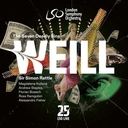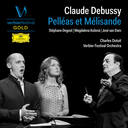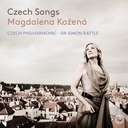We're talking just as you launch into a very busy season of residencies, all of which involve concerts with London's Wigmore Hall where you will be Artist in Residence. The first will be a European tour with Mitsuko Uchida exploring the Lieder repertoire. You're now regular recital partners. What makes the combination of the two of you work so well?
What I so love about Mitsuko, when I'm not just speaking about her talents and the beauty of her playing, is the fact that she loves a lot of preparation. We often take time to rehearse as much as a year or two before we have a project, and that gives us much more freedom. It also means that we know each other better as musicians, and I think that's very important because the relationship between a singer and an accompanist is very tight. Also, for me, as I studied piano before I studied singing, I really know what it is to play piano, and how important it is in these songs to develop a rapport.
The programme you've chosen takes in a huge range of styles: from Schumann's sombre Maria Stuarda Lieder, to Schoenberg's Brettl-Lieder cabaret songs, by way of Dvorák and Wolf. How did you choose it?
It's always a combination of what I would like to sing, what Mitsuko would like to play, and what we feel close to. For instance, we knew we wanted to do some Schumann, and the Maria Stuart songs are very particular late Schumann: very plain, quite static with very simple chords underneath, but at the same time having incredible power, drama and sadness. We felt that they're really not very easy to do, and it was a challenge we wanted to take on. Then, I love Hugo Wolf's songs. I sang a few of the lighter ones some six or seven years ago, and I thought that now was a good time to start to explore them further. The texts of some of them are really very deep, and the textures sometimes almost Wagnerian.
Then with the Dvorák, Mitsuko really wanted to explore some Czech repertoire with me, so we chose the love songs; they're young and fresh, and they bring a different colour compared to the other songs in the programme. And finally, after all this furiously romantic music I wanted to have something a bit lighter in the programme, something people can laugh at, and I think the Schoenberg cabaret songs are a perfect and exciting combination because they have this lightness but also a quite serious accompaniment written by one of that era's great composers.
Another exciting forthcoming residency is your Kammermusik project, touring with a chamber ensemble comprised of your husband Sir Simon Rattle and members of the Berliner Philharmoniker. How did that come about?
It was actually an idea from the Wigmore Hall when they invited me to be Artist in Residence; they said they'd like to not only have a recital, but also a chamber music concert and perhaps also something staged. Then, the other cities we were performing in accepted these crazy ideas I had too! And it's fantastic to do something like this, because for a singer to get together with a chamber group is becoming harder and harder. Sadly, the audience for a Lieder evening is just a little bit smaller than it used to be, which means that organisers are scared to put on such events regularly.
Your programme features a lot of Czech repertoire. Does it feel special to be performing that with these particular musicians?There will actually be a set of Dvorák songs that will have been arranged for the ensemble especially for the occasion, by the English composer and conductor Duncan Ward. So, I'm very much looking forward to having those new arrangements. We're also doing Janáček's Říkadla in an arrangement I found for voice, piano and clarinet, which is something of a rarity. Everybody knows Říkadla in its final choral version, but Janáček's first sketches are for clarinet and piano. They're almost never performed.
Then, during February and March 2016 you're touring once again with the Baroque orchestra, La Cetra, under the baton of Andrea Marcon. What are you most anticipating about this project?
It's wonderful repertoire, with a wonderful Baroque group. I've also worked with Andrea Marcon before, and I think musically we are very much tuned on the same wavelength. He's always very inspiring and fun to work with. This is going to be quite a special project too; the production will be semi-staged by the Czech director Ondřej Havelka, and will feature some very modern music alongside the music of Monteverdi.
The programming of Berio's Sequenza III caught my eye. Are you going to find the transition between it and its preceding Baroque repertoire interesting?
Working on it, I think there's some ingenious spacing there. Obviously I can't say much beforehand because it's going to be a surprise, but it's all very exciting. It's a lot of work, but it's going to be worth it.
You're teaming up again with Ondřej Havelka next July, but this time to sing a Big Band programme of music from the 1920s and 1930s with his swing band, The Melody Makers. I know that this is music you enjoy in your free time, but to now be singing it yourself feels like quite a departure for you.
Yes it is. Normally I don't like crossovers, or when opera singers try to sing other styles. It always sounds a bit unnatural to me, even though some classical musicians do it well. However I was quite encouraged by hearing Frederica von Stade, who is one of the singers I particularly admire, record a CD of Cole Porter; she sings the songs the way she sings classical music, which I thought was a really nice way to do it. So, I'm not going to try to sound like a jazz singer; I'd like instead to simply sing these songs the way I normally sing. Now of course, as with any new style there are things one has to learn. For instance, I'm already working with the band on aspects such as how the rhythms swing and how they're written within the bars. And of course you have to sing in such a way that people understand every single word, otherwise it becomes too operatic. But, the idea is to present this music with my own feel.
Ondřej also dances. Will you be dancing too?!
Maybe there will be a little something, but I'm definitely not going to do anything big!
Your other notable London date in the near future is Pelléas et Mélisande in January, with the London Symphony Orchestra and Simon Rattle in a new semi-staged production by Peter Sellars. It sounds both exciting and intriguing.
I was involved in the St John and St Matthew Passions that Peter Sellars did with the Berliner Philharmoniker, and it was wonderful to be part of something like that. It's always fantastic to share wild ideas and to be inspired by him, and I think Pelléas will suit semi-staging very well; it's so balletic, and the music kind of carries it in a way that often makes you want to hear every word and yet you have too much staging around it. So, I'm excited and curious to see what he will do with this piece.
Moving into more personal territory, how do you manage to get the balance between such an array of residencies and a family life, particularly when the youngest of your three children is only fourteen months old? As a mother myself, I'm personally rather in awe of what you're accomplishing!
Well it's not easy! You always feel, 'Oh, I should be more with my child', and now this is a tough year. I've had all these residency projects booked in, and now I'm trying to fit in everything I want to do, but to do it with three children - it's difficult! But, you just have to be very efficient with your time. So, if you have two hours to practice, you can't just pick up the phone in the middle of it, because then you will only have an hour and a half, which you will feel. So you have to be strict with yourself.
It would be hard for your children to be growing up within a more musical household. Are you actively musically “educating” them at home?
Well, we try to bring them music, and my older sons play instruments, but I'm not a pushy mother in that sense. It's not a 'must' that my children are going to be musicians; I like to support them in whatever passion they have, and actually I sometimes think that it would be good for somebody to do something more useful like be a lawyer or repair my bike! That said, I do want to help them to love music as listeners or amateur players, just to give them that enjoyment for their lives. What's most important though is that they don't do it as a duty, but because they like doing it.
There's an ongoing debate in the UK over the place of music within the school curriculum. What are your own thoughts on music's relevance within the wider academic education?
I am a big supporter of music education, and it doesn't always necessarily have to be always classical music. For example, my sons have a wonderful music teacher who is bringing them all kinds of stuff: they're singing Beatles, and recently they did their own kind of theatre play version of Die Zauberflöte which all the kids loved, even those who would normally say they hate classical music. So for me, the important thing is to bring young people all kinds music and see what they like, and to bring it to them in a playful and interesting way. But yes, I think that music, as well as the other arts, should be in schools because it brings a different kind of creativity. We all know that there are parts of the brain which are especially active when we do maths, whilst other parts get used through music or painting. So, it's a very important training for your brain, emotions, and knowledge.
To end the interview, what are your thoughts on where you are right now? Could your career possibly involve more excitement or variety than it does now?!
I don't think that it's variety that's missing in my life, whatever else is! No. When you are young, you're always thinking about what you want to do next and with whom. Then, you reach the point where I think I am, where you can do projects which will make you feel happy; you no longer feel that you have to prove yourself, and I think that's the kind of prize for all the hard work you do at the beginning. I remember when I was in my twenties there was nothing more important than what I was going to do next. Now I have my family, which is of course absolutely the most important thing, plus I'm in this position in which I can do what I like, when I like and with whom I like, and I think it's wonderful!
© Charlotte Gardner



